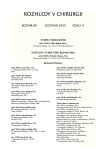Segmental Absence of the Muscularis Propria Layer in the Colonic Wall– A Rare Cause of Colonic Perforation during Pregnancy
Authors:
V. Procházka
; T. Svoboda; O. Souček *
; Z. Kala
Authors‘ workplace:
Chirurgická klinika FN Brno Bohunice a LF MU Brno, přednosta: prof. MUDr. Z. Kala, CSc.
; Patologicko-anatomický ústav FN Brno Bohunice a LF MU Brno, přednosta: doc. MUDr. Feit J., CSc.
*
Published in:
Rozhl. Chir., 2010, roč. 89, č. 11, s. 679-681.
Category:
Monothematic special - Original
Overview
Segmental absence of intestinal musculature (SAM) may, rarely, present with symptoms of ileus or intestinal perforation. Most commonly, the disorder presents with signs of intestinal disorders in newborns. Colonic perforations are then rare in adulthood.
In this study, the authors present a case of a young female patient, operated for right abdominal pains when she was 30 weeks pregnant. Although no advanced appendicitis was confirmed, appendectomy was performed. Five days later, surgical revision was indicated for signs of septic condition and abdominal pain. Two perforations of the ascending colon and diffuse peritonitis were found. Section and right-sided hemicolectomy were performed. The final identification of the cause was based on histological examination of the resecate. The perforations were located at the sites, where the intestinal muscular layer was absent. This finding has also got forensic consequences. It revealed a rare cause of colonic perforation, which is undetectable on examination and confirmed that no mistakes were made during the first procedure. The authors did not find any literature data on colonic perforations due to the colonic muscle layer absence during pregnancy.
Key words:
peritonitis – colonic perforation – absence of the muscle layer - pregnancy
Sources
1. Lakyová, L., Belák, J., Kudláč, M., Vajó, J., Toporcer, T., Radoňak, J. Appendicitída v gravidite. Rozhl. Chir., 2008; 87 : 536–541.
2. Herbut, P. A. Congenital defect in the musculature of the stomach with rupture in a newborn infant. Arch. Pathol., 1943; 36 : 91–94.
3. McCarthy, D. W., Qualman, S., Besner, G. E. Absent intestinal musculature: Anatomic evidence of an embryonic origin of the lesion. J. Pediatr. Surg., 1994; 29 : 1476–1478.
4. Husain, A. N., Hong, H. Y., Gooneratne, S., Murakas, J., Black, P. R. Segmental absence of small intestinal musculature. Pediatr. Pathol., 1992; 12 : 407–415.
5. Kalousová, J., Fryč, R., Dubovská, M., Melichar, J., Šnajdauf, J. Congenital segmental aplasia of intestinal muscularis: a rare disorder mimicking necrotizing enterocolitis. Pediatr. Surg. Int., 1995; 10 : 54–55.
6. Tawfik, O., Newell, B., Lee, K. R. Segmental absence of intestinal musculature in an adult. Dig. Dis. Sci., 1998; 43 : 397–399.
7. Penka, I., Kaplan, Z., Šefr, R., Ondrák, M., Eber, Z., Pavlovský, Z. Neobvyklá příčina chronického ileózního stavu – absence muscularis střevní stěny. Rozhl. Chir., 2005; 84 : 363–365.
8. Darcha, C., Orliaquet, T., Levrel, O., Pezet, D., Lointier, P., Chipponi, J., Dechelotte, P. Segmental absence of colonic muscularis propria. Report of a case in adult. Ann. Pathol., 1997; 17 : 31–33.
9. Gosseye, S., Libotte, B., Moulin, D., Buts, J. P., Otte, J. B. Localized absence of colonic musculature: an unusual cause of perforation in a colonic esophageal transplant. Pediatr. Pathol., 1985; 4 : 143–148.
10. Pavlovský, Z., Habanec, B., Hermanová, M., Penka, I., Kaplan, Z. Segmentální chybění střevní svaloviny. Čes.-slov. Patol., 2003; 39 : 85–87.
Labels
Surgery Orthopaedics Trauma surgeryArticle was published in
Perspectives in Surgery

2010 Issue 11
- Possibilities of Using Metamizole in the Treatment of Acute Primary Headaches
- Metamizole at a Glance and in Practice – Effective Non-Opioid Analgesic for All Ages
- Metamizole vs. Tramadol in Postoperative Analgesia
-
All articles in this issue
- Posttraumatic Atlantoaxial Rotatory Fixation in a Child
- Intrathoracic Goitre – Undiagnosed – Nevertheless Operated
- Axillary Dissection in the Surgical Management of Invasive Breast Cancer in Postmenopausal Female Patients
- Torsion of the Omentum – An Uncommon Cause of Acute Abdomen
- Abdominal Catastrophe – Abdominal Wall Defect Associated with Gastrointestinal Fistula – Strategy of Therapy
- Segmental Absence of the Muscularis Propria Layer in the Colonic Wall– A Rare Cause of Colonic Perforation during Pregnancy
- Mucinous Adenocarcinoma of the Appendix – Case Report
- Intraoperative Radiotherapy in Multimodality Treatment of Locally Advanced Rectal Carcinoma
- Five-Year Follow up in Patients after Surgery for Clear Cell Renal Carcinoma
- Lymphatic Mapping and Biopsy of Sentinel Lymph Nodes Using Combined Methodology of In Vivo Application of Patentblue and Radionuclide and Ex Vivo Detection of Metastatic Affection of Lymph Nodes in Colorectal Carcinoma
- Mapping of the Superficial Venous System on the Lower Extremities before and after the Varicose Veins Surgery – Summarizing Paper of Specific Aspects during the Duplex Ultrasound Imaging
- Perspectives in Surgery
- Journal archive
- Current issue
- About the journal
Most read in this issue
- Mucinous Adenocarcinoma of the Appendix – Case Report
- Abdominal Catastrophe – Abdominal Wall Defect Associated with Gastrointestinal Fistula – Strategy of Therapy
- Five-Year Follow up in Patients after Surgery for Clear Cell Renal Carcinoma
- Torsion of the Omentum – An Uncommon Cause of Acute Abdomen
